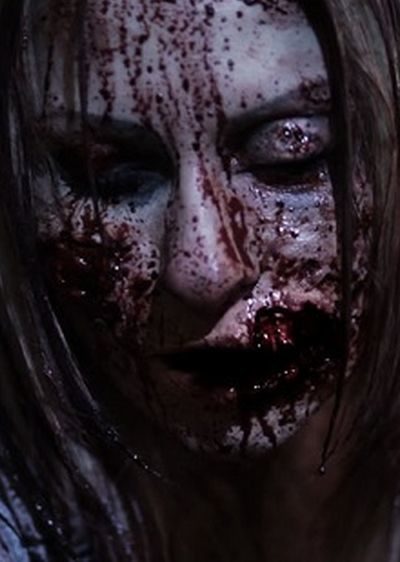★★½
“Insane Clown Posse”
 At first, I wondered if this was some kind of post-apocalyptic work, with Ursula (Giorgi) the leader of a face-painted tribe, enforcing discipline with extreme brutality on her minions. But it turns out to be everyday society: she actually heads a group of “street performers” [I guess; not quite sure what they do, but it’s likely something between mime and a freak show]. who survive by extracting money from members of the public. Ursula’s next target is Mary (Babusci), who pulls over in her car to have a phone conversation (an admirably safe approach, it has to be said), only to find herself being menaced by Ursula. Panicking, Mary pulls a gun on the whey-faced loonette, and drives off. Despite making it safely back to the apartment where she lives with her dog, Judy, it becomes increasingly apparent that Ursula has not taken kindly to her rejection at gunpoint, and will have her revenge – both on Mary and Judy.
At first, I wondered if this was some kind of post-apocalyptic work, with Ursula (Giorgi) the leader of a face-painted tribe, enforcing discipline with extreme brutality on her minions. But it turns out to be everyday society: she actually heads a group of “street performers” [I guess; not quite sure what they do, but it’s likely something between mime and a freak show]. who survive by extracting money from members of the public. Ursula’s next target is Mary (Babusci), who pulls over in her car to have a phone conversation (an admirably safe approach, it has to be said), only to find herself being menaced by Ursula. Panicking, Mary pulls a gun on the whey-faced loonette, and drives off. Despite making it safely back to the apartment where she lives with her dog, Judy, it becomes increasingly apparent that Ursula has not taken kindly to her rejection at gunpoint, and will have her revenge – both on Mary and Judy.
What’s particularly interesting here is, this is a horror film almost entirely without male characters. There isn’t a single speaking, on-screen male role: there is a emergency dispatcher whom Mary calls on her cellphone (before Ursula’s blocker kicks in), and one of the villains could be male, since they wear a mask and never speak. But otherwise, not just protagonist and antagonist but all the supporting roles – hell, even the dog! – are female. That’s not common in any genre; it’s likely entirely unique in the “home invasion” sub-division of horror. De Santi sets the table well, quickly establishing both the ruthless brutality of Ursula as well as her mercurial nature: Giorgi does very well at putting over the idea that her character could explode into savage violence at any second.
Significantly less effective is the middle section, which largely consists of Mary pottering around her flat. There are attempts at building menace, such as a creepy-looking robe in the bathroom, or incoming phone-calls consisting of almost dead-air. However, there’s no real sense of escalation or progression to these, and they appear little more than trivial gimmicks. Things ramp up appreciably when Judy goes missing from the locked apartment. Mary goes to look for her canine on the beach, but the answer to the mystery may be closer to home than she initially thinks, and when she discovers that… Hoo-boy. There’s also the question of what, exactly, Ursula keeps in that manacled, spike-encrusted box (and, perhaps, also the one of how the hell she got it up all those stairs).
To call the ending abrupt, on the other hand, would be the understatement of the year. Admittedly, it doesn’t seem like there’s anywhere else the story could go, at the point when the credits roll; yet there’s usually at least a momentary coda at the end of most movies. Here? Not so much. All told, it would likely have worked better as a short film, in the 15-20 minute range, which gives you an idea of how much padding is present. Still, given the low budget, it is certainly better than some I’ve endured, and is helped by a creepy central premise, especially if you suffer from coulrophobia. Look it up…
Dir: Emanuele De Santi
Star: Orietta Babusci, Marlagrazia Giorgi




